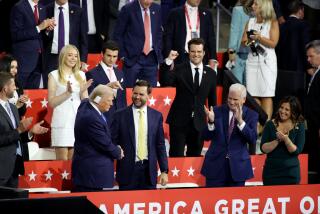Pilots’ ‘Friendly Fire’ Hearing Opens With Focus on Pep Pills
A hearing on whether two U.S. fliers should face courts-martial for mistakenly bombing Canadian soldiers in Afghanistan got underway Tuesday at Barksdale Air Force Base with sharp attacks by the airmen’s attorneys on the military’s practice of giving pep pills to fatigued pilots.
At issue is whether Maj. Harry Schmidt, 37, and Maj. William Umbach, 43, formerly full-time Air Force pilots now in the Illinois National Guard, are criminally liable for dropping a 500-pound bomb on a Canadian military unit training in Afghanistan.
Four Canadians were killed and eight were wounded in the bombing near Kandahar on April 17. The Air Force subsequently pursued criminal charges against the pilots, contending that they failed to follow proper procedure and make sure there were no allied troops in the area. Each faces up to 64 years in prison.
Capt. Joseph Jasper, the Canadian unit’s second in command, told the hearing that his soldiers were firing at simulated targets during a night exercise.
“The bomb hit and we all hit the ground,” Jasper said. “We all basically turned to each other and said, ‘What the hell was that?’ ”
The criminal charges are unprecedented in a so-called friendly fire incident in time of war. Critics have suggested the Air Force caved to political and diplomatic pressure from the government of Canada, one of the United States’ staunchest allies. The deaths were Canada’s first on the battlefield since the Korean war.
A joint investigation by Canadian and U.S. military authorities found Schmidt and Umbach at fault in the attack, but also found that they had not been told in advance of the Canadian maneuvers.
David Beck, lawyer for Umbach, and Charles W. Gittins, Schmidt’s lawyer, told Col. Patrick Rosenow, who is presiding over the hearing, that amphetamines may have impaired the pilots’ judgment. The stimulants have been used by fliers since World War II, and were routinely doled out by Air Force physicians during the Persian Gulf War and in Afghanistan.
“We believe the Air Force has a problem,” Beck told Rosenow. “They have administered, for a long time, ‘go pills’ to soldiers that the manufacturers have stated affect performance and judgment. Also, when [pilots] come back they are given an antidepressant. That is the reason we have concern.”
In filing the charges of involuntary manslaughter, assault and dereliction of duty, authorities said the pilots acted recklessly and violated rules governing use of force in the Afghanistan campaign.
Their lawyers have said the two pilots were not told that Canadians were conducting nighttime live-fire exercises and believed that their F-16s were under attack from the Taliban or Al Qaeda. Under military law, the Article 32 hearing -- similar to a grand jury proceeding in the criminal justice system -- will lead to a recommendation from Rosenow on whether to proceed with courts-martial. Rosenow’s recommendation will go to Lt. Gen. Bruce Carlson, commander of the 8th Air Force, based at Barksdale, who will make the final decision.
Only once before has a U.S. service member been charged in a “friendly fire” incident. In that case, the peacetime downing of two Army Black Hawk helicopters over northern Iraq by a U.S. aircraft in April 1994, a radar officer was acquitted.
Both pilots are national guardsmen who had been called up for temporary duty in Afghanistan. Critics of the increased demands being placed on members of the Reserves and the National Guard in the last decade have speculated that some Reserve pilots may not have the same levels of training or experience as their active-duty counterparts.
But Schmidt and Umbach were seasoned combat pilots. Schmidt, who dropped the laser-guided bomb after seeing what he said looked like flashes of gunfire, is a former Navy F/A-18 Hornet pilot and a former F-15 instructor pilot at the Navy’s elite Top Gun school. Umbach is a United Airlines pilot who flew F-16 sorties on weekends.
*
Hart reported from Shreveport and Schrader from Washington. Reuters contributed to this report.
More to Read
Sign up for Essential California
The most important California stories and recommendations in your inbox every morning.
You may occasionally receive promotional content from the Los Angeles Times.






